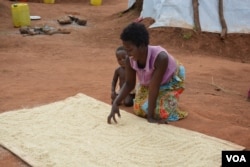The United Nations World Food Program (WFP) says it is urgently looking for $38 million to buy food for nearly three million people facing starvation in Malawi. The appeal comes after the WFP extended its food relief operation by a month. The U.N. and its partners have been providing food and cash assistance to hunger-stricken Malawians since last October. The country is facing its worst food shortage in a decade, largely caused by flooding and drought last year.
The WFP says without additional contributions, cash distributions will have to be suspended next month, while food distributions will be drastically reduced or even discontinued by mid-April.
Local media reported recently that some Malawians are surviving on maize husks, which are normally meant for animal feed.
Amina Khalid, a Blantyre resident, told VOA that the government’s main grain marketer, the Agriculture Development and Marketing Corporation (ADMARC) is also short on maize.
“As of now people are sleeping in ADMARC depots waiting to purchase maize. Last week a woman fainted in Balaka District as she was waiting to purchase maize there, so the food shortage situation is really worse now,” said Khalid.
Currently ADMARC depots allow an individual to buy only 20 kilograms of maize at a time. Khalid said this is not enough.
“You can’t tell a family of 10 people to get 20 kilograms. That means they will only eat in the afternoon. What will happen in the evening? That means they will go back to ADMARC depot to purchase another 20 kilograms for that evening," said Khalid.
Private maize traders, the WFP says, have taken advantage of the shortage situation by raising prices - 175 percent higher - making it increasingly difficult for many people to buy food.
Opposition leader in parliament, Lazarus Chakwera, asked the national assembly on Monday to observe a minute of silence to remember people who have died because of hunger.
Food rights activist Tamani Nkhono said the food shortage situation could have been minimized.
“In June 2015, there was an announcement that there was going to be El Niño. And we all know that the effects of El Niño is either going to be floods or drought. Having been told, we would have come up with a good package to prepare for that, but that package was never there. Instead, investments went into rain-fed agriculture when we knew that rain was going to be a problem,” said Nkhono.
Malawi government authorities vehemently deny that there is food shortage.
Minister of Agriculture Allan Chiyembekeza said last week that the government has procured 50,000 metric tons of maize, enough to feed Malawians until the next harvest season.
He said reports of a food shortage are baseless.








